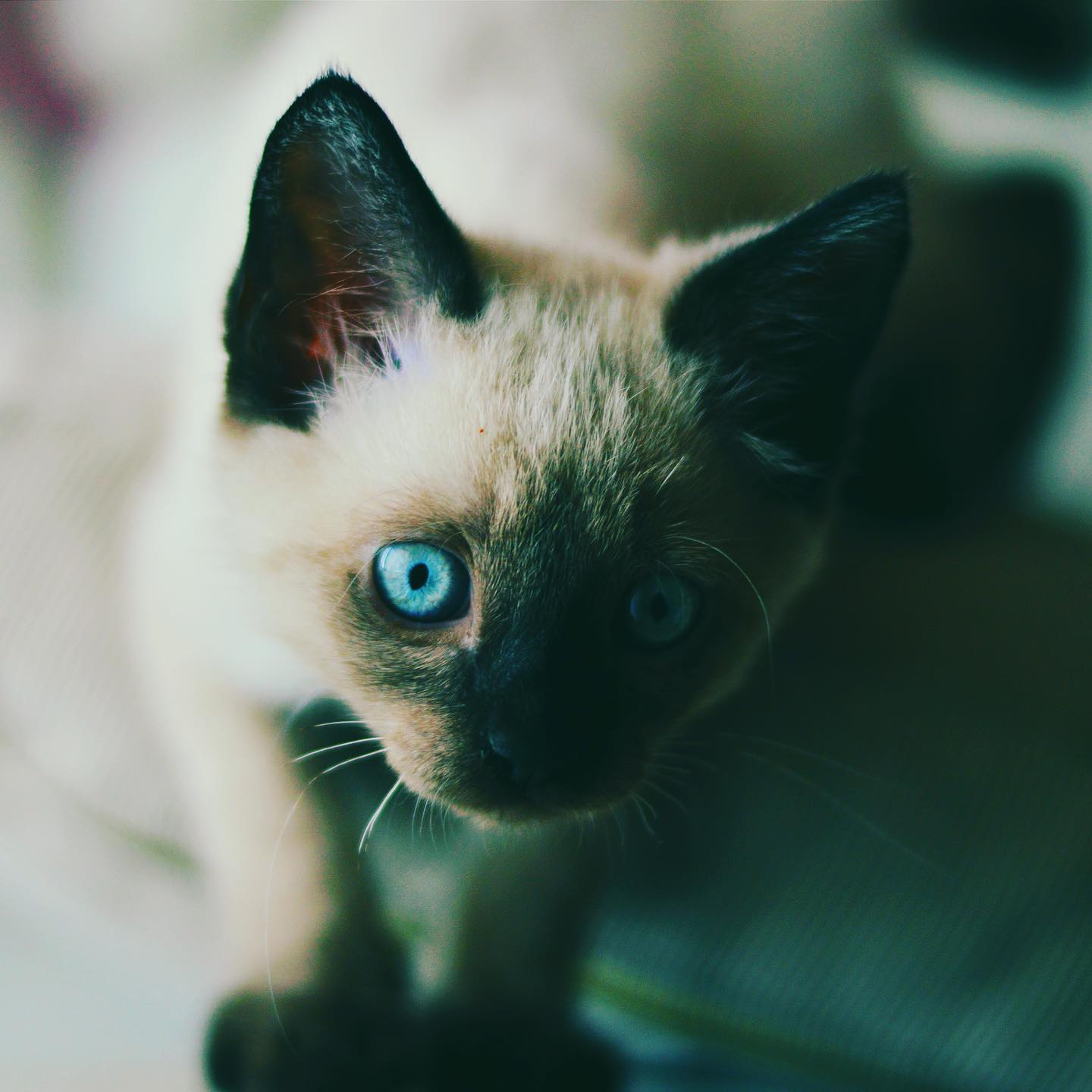I love plants and have cats, so I always wondered if they could get along. Are orchids safe for cats? This question kept me up at night when I started gardening indoors. I wanted to know if these beautiful flowers were safe for my pets.
The good news is that most orchids are safe for cats. The ASPCA says about 70% of orchids are okay for pets. So, you can relax and enjoy these stunning plants in your home.
It’s important for pet owners to know which orchids are safe. Not all plants are the same. While most orchids are safe, some precautions are needed to keep your cat happy and healthy.
With the right knowledge, your home can be a happy place for both orchids and cats. Learning about plant safety and how to place them can help. This way, you can enjoy the beauty of plants and the company of your pets.
In this guide, we’ll cover everything about orchids and cat safety. You’ll learn which orchids are safe and how to spot potential dangers. This will help you bring these beautiful plants into your home safely.
Table of Contents
Introduction to Orchids and Cats
Exploring the world of orchids can be exciting for pet owners. It’s important to know which plants are safe for cats. Orchids are a great choice for those who love indoor plants.
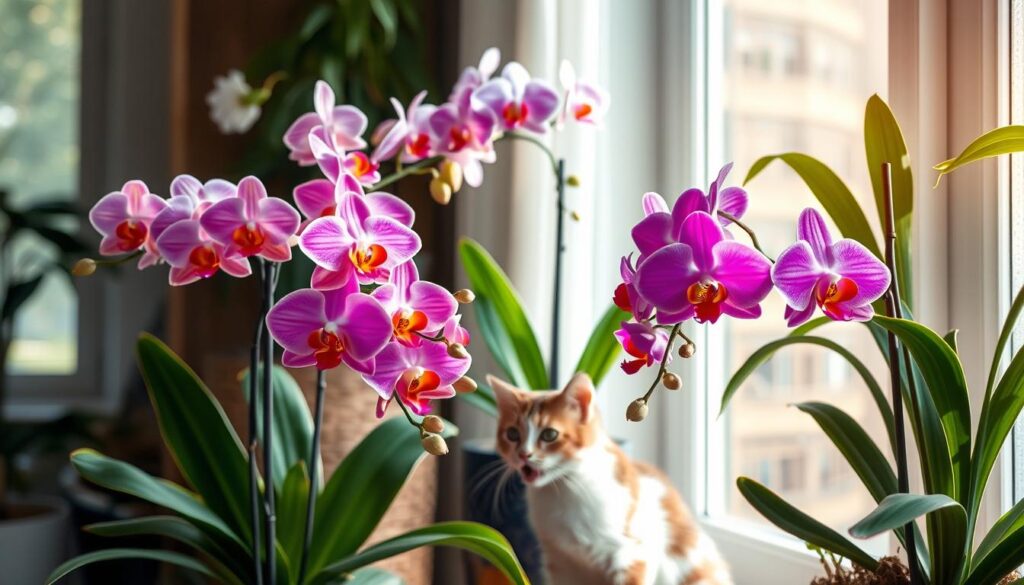
A Glimpse into the Orchid Universe
Orchids are stunning houseplants with beautiful blooms and colors. They can make any room look amazing. With over 25,000 species, there’s an orchid for everyone.
- Over 25,000 species of orchids exist worldwide
- Phalaenopsis orchids are most common as houseplants
- Orchids can bloom for up to 3 months
Debunking Orchid Myths
Many people think orchids are dangerous for pets. But, not all plants are the same when it comes to pet safety. Many orchids are safe for cats.
| Orchid Type | Pet Safety Status | Care Difficulty |
|---|---|---|
| Phalaenopsis | Safe for Cats | Easy |
| Dendrobium | Generally Safe | Moderate |
| Cattleya | Relatively Safe | Challenging |
Prioritizing Pet Safety
About 35% of pet owners don’t check if plants are safe before buying. But you can be different. Knowing which plants are safe is key to a happy home for both pets and plants.
Your pet’s safety should always be the top priority when introducing new plants to your home.
By choosing the right plants and staying informed, you can enjoy orchids. And keep your cat safe and happy.
Popular Orchids and Their Characteristics
Exploring orchids can be thrilling for plant lovers, especially those with cats. Knowing about different orchids helps you pick safe plants for your home.
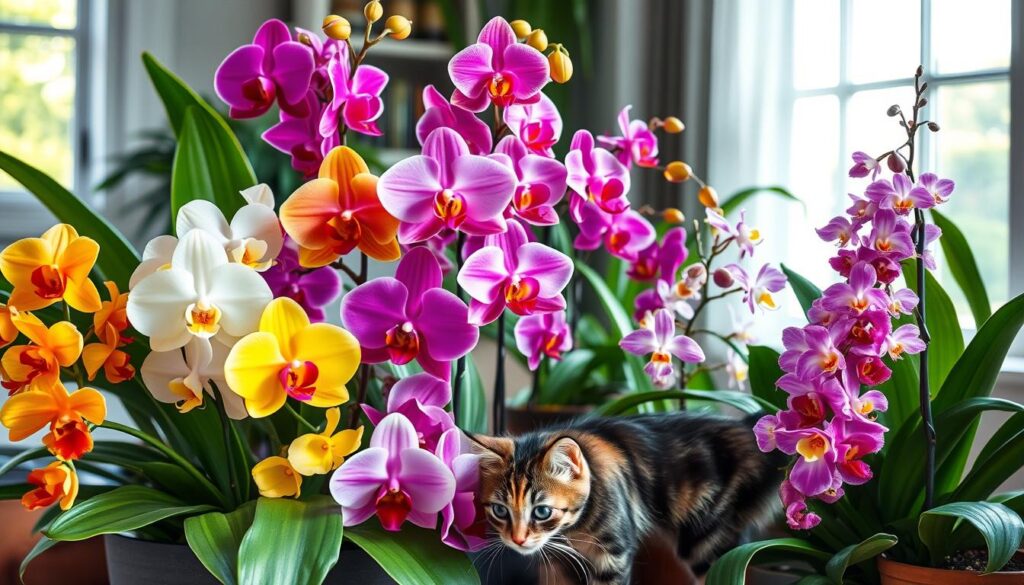
There are over 25,000 orchid species worldwide. Not all are safe for cats. Let’s look at three safe orchid types for your furry friends.
Phalaenopsis Orchids
Phalaenopsis orchids, or moth orchids, are very popular. They are safe for cats and have:
- Long-lasting blooms
- Easy care requirements
- Non-toxic to cats according to the ASPCA
Dendrobium Orchids
Dendrobium orchids are great for cat owners. They have:
- Diverse color ranges
- Compact growth patterns
- Minimal risk to pets when properly maintained
Cattleya Orchids
Cattleya orchids add beauty to your home. But, cat owners should know:
- Large, showy flowers
- Require specific light conditions
- Generally considered safe for cats
“Creating a harmonious space where plants and pets coexist is an art of careful selection and placement.” – Plant Care Experts
Even though these orchids are safe, cats might still have a reaction. Cats are meat-eaters and their stomachs might not like plant material. This could lead to mild symptoms like vomiting or upset stomach.
Recognizing Toxic vs. Non-Toxic Orchids
Knowing the difference between toxic and non-toxic orchids is key for cat owners who love plants. Most orchids are safe for cats, which is great news for pet owners.
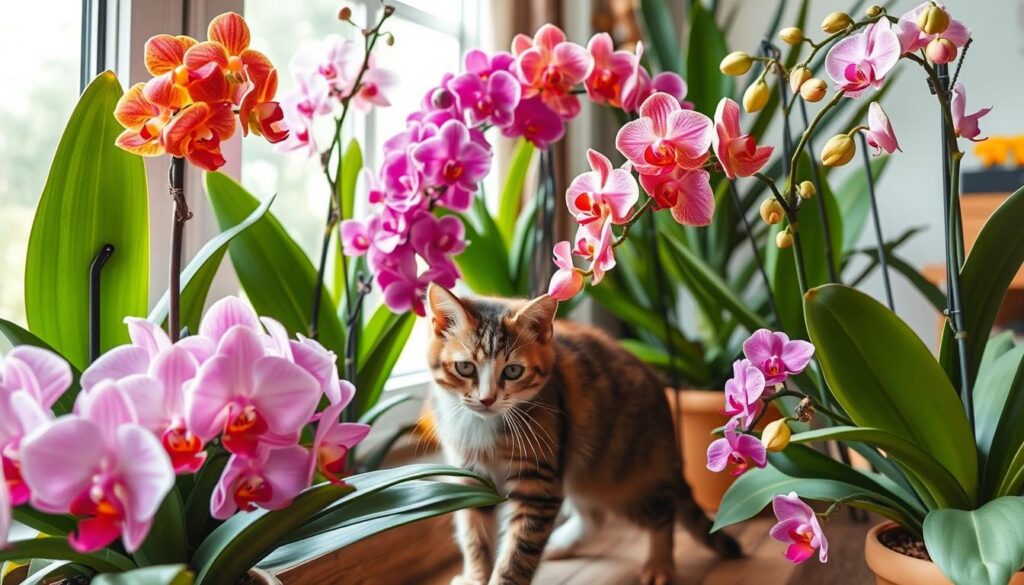
The ASPCA says orchids are safe for cats. This lets you enjoy these plants without worrying about your cat’s health. Not all plants are created equal, so knowing about orchids is important.
Signs of Toxicity in Plants
Watch for these signs in plants that might be toxic to cats:
- Excessive drooling
- Vomiting
- Difficulty breathing
- Changes in behavior
- Lethargy
Specific Orchids Considered Safe
Many popular orchids are safe for your cat. Some safe cat-friendly orchids include:
- Phalaenopsis orchids
- Dendrobium orchids
- Cattleya orchids
Specific Orchids Considered Hazardous
Even though most orchids are safe, be careful about chemicals. Fertilizers or pesticides can be more dangerous to your cat than the plant.
“Prevention is always better than cure when it comes to pet safety.” – Veterinary Experts
In 2023, about 9,000 cases of cat plant poisoning were reported. This shows how important it is to know about toxic plants. With orchids, you can relax knowing they’re mostly safe for cats.
Health Risks Associated with Orchids and Cats
Pet owners often wonder if orchids are safe for their cats. It’s important to know the health risks to care for pets well.
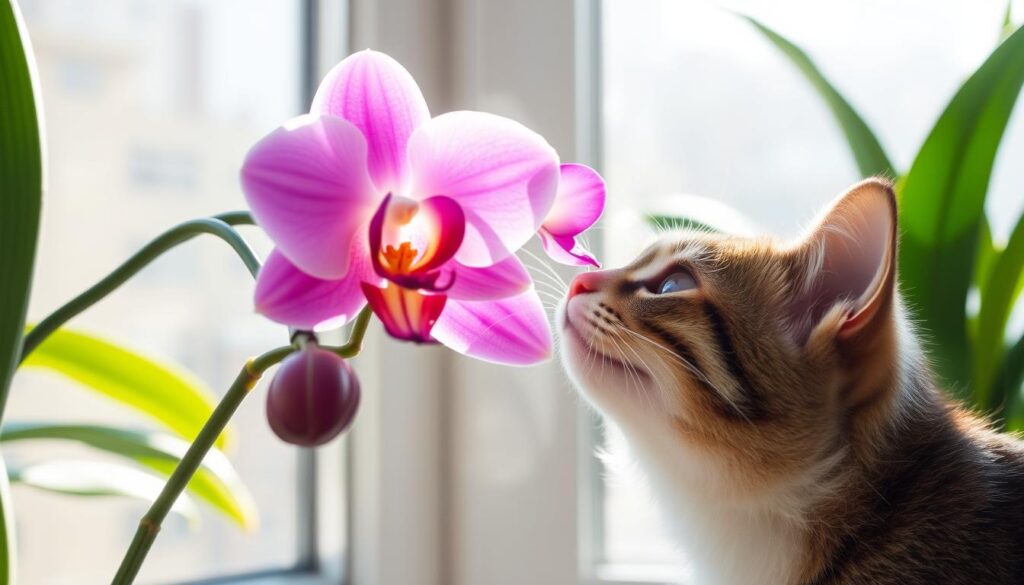
Orchids are not usually toxic to cats. Most types are safe, but they can still cause problems.
Potential Symptoms of Ingestion
If your cat eats an orchid, they might feel a bit sick:
- Mild stomach upset
- Potential vomiting
- Slight discomfort
- Temporary loss of appetite
Long-Term Health Considerations
Most orchids are not a big risk for cats’ long-term health. They are safer than many houseplants. But, every cat is different.
Immediate Actions if Ingested
If your cat eats an orchid, do these things:
- Remove any plant material from the cat’s mouth
- Monitor your cat for unusual behavior
- Offer fresh water
- Contact your veterinarian if symptoms persist
“Prevention is always better than cure when it comes to pet safety.” – Veterinary Experts
Even though orchids are mostly safe, watch your cat around plants. Make sure your home is safe for pets.
Keeping Your Home Safe for Cats and Orchids
Creating a safe space for your cats and orchids needs careful planning. It’s not just about picking safe plants. It’s also about keeping both your plants and pets safe.
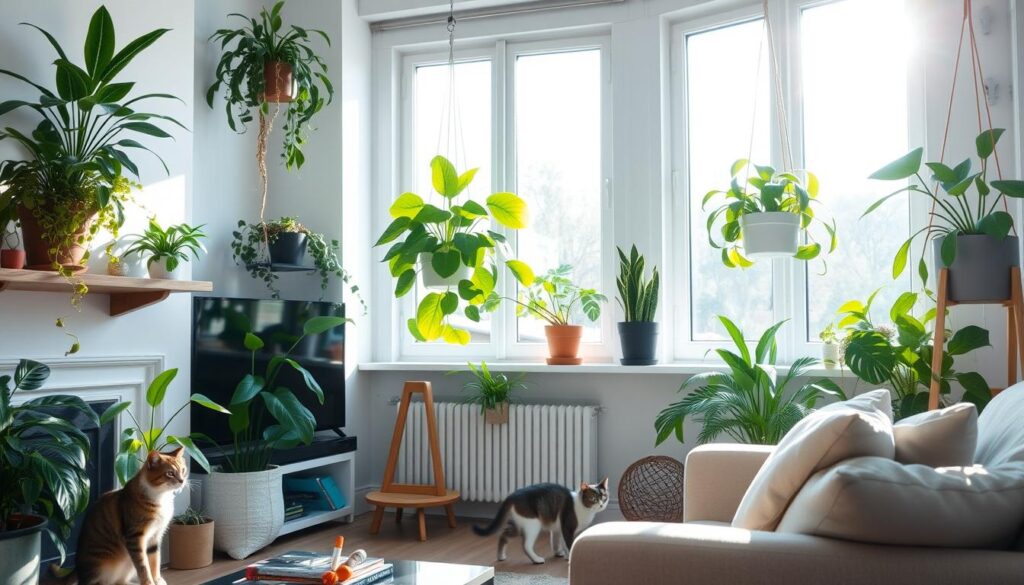
There are over 25,000 orchid species, making it easy to find cat-friendly ones. Most orchids are safe for cats, the ASPCA says.
Best Placement Strategies
Keeping your orchids and cats safe means smart placement. Here are some tips:
- Hang orchids from ceiling hooks out of cat’s reach
- Use high shelves with barrier protection
- Create dedicated plant zones using room dividers
- Utilize wall-mounted planters
Non-Toxic Plant Alternatives
Looking for more safe plants for your cat? Here are some good options:
| Plant Name | Pet Safety Rating | Care Difficulty |
|---|---|---|
| Spider Plant | 100% Safe | Easy |
| Boston Fern | 100% Safe | Moderate |
| Areca Palm | 100% Safe | Easy |
Creating a Safe Environment
Even though orchids are safe, it’s important to be careful. Cats are meant to eat meat, not plants. This can lead to problems like choking or upset stomachs.
- Choking hazards from plant material
- Potential gastrointestinal upset
- Risks from fertilizer chemicals
“The secret is creating boundaries that protect both your plants and your pets.” – Pet Safety Expert
With the right strategies, you can have beautiful orchids and keep your cat safe. About 13% of U.S. homes have both pets and plants, showing it’s doable with the right planning.
Tips for Caring for Orchids Around Cats
Creating a harmonious environment for both your beloved cats and delicate orchids requires careful planning. Understanding how to maintain your plants while keeping your feline friends safe is crucial for a happy home.
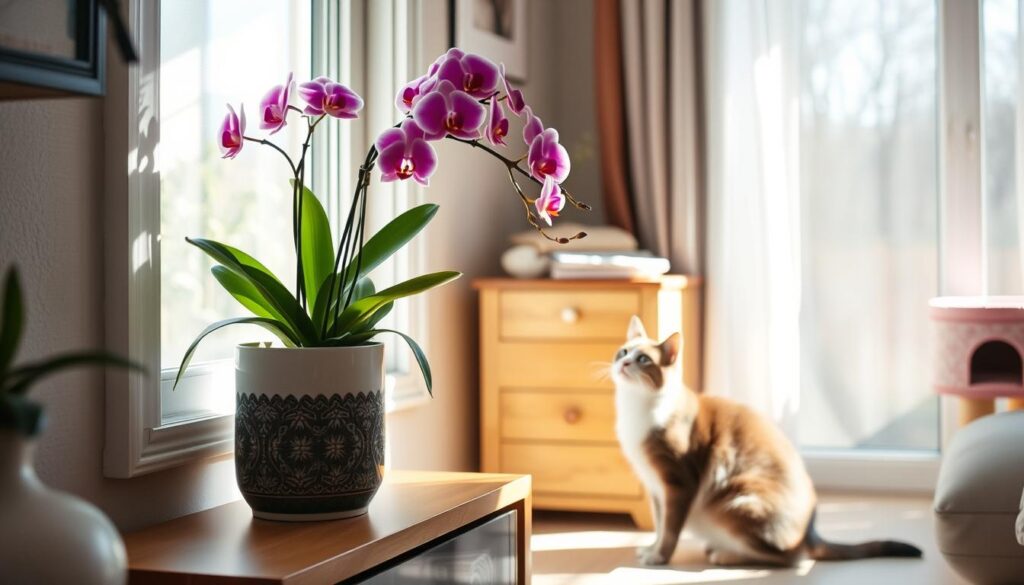
When cultivating cat-friendly orchids, several key strategies can help protect both your plants and your pets:
Proper Watering Techniques
Watering orchids demands precision to prevent curious cats from becoming interested. Consider these approaches:
- Use shallow, stable containers to minimize water spillage
- Water plants in a designated area away from cat traffic
- Clean up any water drips immediately
Choosing Non-Toxic Fertilizers
Selecting safe fertilizers is essential for pet-friendly orchid care. Look for organic, chemical-free options that won’t harm your cats if accidentally ingested.
“The safety of your pets should always be the priority when caring for houseplants.” – Plant Care Expert
Maintaining Cat-Free Zones
Creating dedicated spaces for your orchids can prevent unwanted interactions. Consider these strategies:
- Use elevated shelves or hanging planters
- Install pet barriers around plant areas
- Use natural deterrent sprays to discourage cat exploration
Remember, with careful planning and attention, you can successfully grow beautiful orchids while keeping your feline companions safe and happy.
Cat Behavior Around Plants
It’s important to understand how cats interact with plants to keep your home safe. Cats are naturally curious and often find themselves drawn to greenery, like orchids and other houseplants.
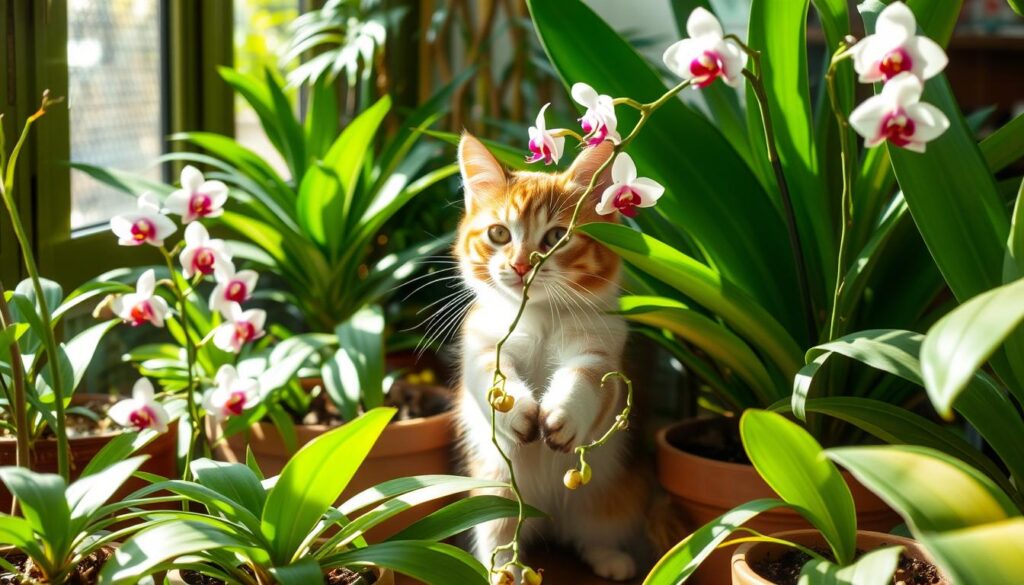
Cats explore their world through senses like sight, smell, and touch. Their reasons for being interested in houseplants can vary a lot.
Why Cats Are Drawn to Plants
- Curiosity about new textures and movements
- Instinctive hunting and play behaviors
- Potential nutritional exploration
- Seeking attention from their owners
Importance of Monitoring Playtime
Watching how your cat interacts with plants is key. The ASPCA says over 8 percent of animal poison control calls in 2022 were about pets eating toxic plants.
“Prevention is always better than cure when it comes to pets and plants.”
Training Cats to Avoid Certain Areas
| Training Method | Effectiveness |
|---|---|
| Positive reinforcement | High |
| Deterrent sprays | Medium |
| Physical barriers | High |
Managing orchids and pets well can make your home a peaceful place. Each cat is different, so be patient and consistent in training them to stay away from plants.
Consultation with a Veterinarian
Pet owners need to watch their cats around plants, especially orchids. Knowing when to get vet help is key to keeping your pet safe.
When to Seek Professional Help
It’s important to know when your cat needs a vet right away. If you think your cat ate a toxic plant, like an orchid, look for these signs:
- Excessive vomiting
- Unusual lethargy
- Continuous drooling
- Changes in drinking or urination patterns
- Loss of appetite
Critical Questions to Ask Your Veterinarian
Make a list of questions to ask your vet about orchids and cats:
- What specific symptoms should I watch for after plant exposure?
- How quickly should I bring my cat in after potential plant ingestion?
- Are there any immediate home treatments I can administer?
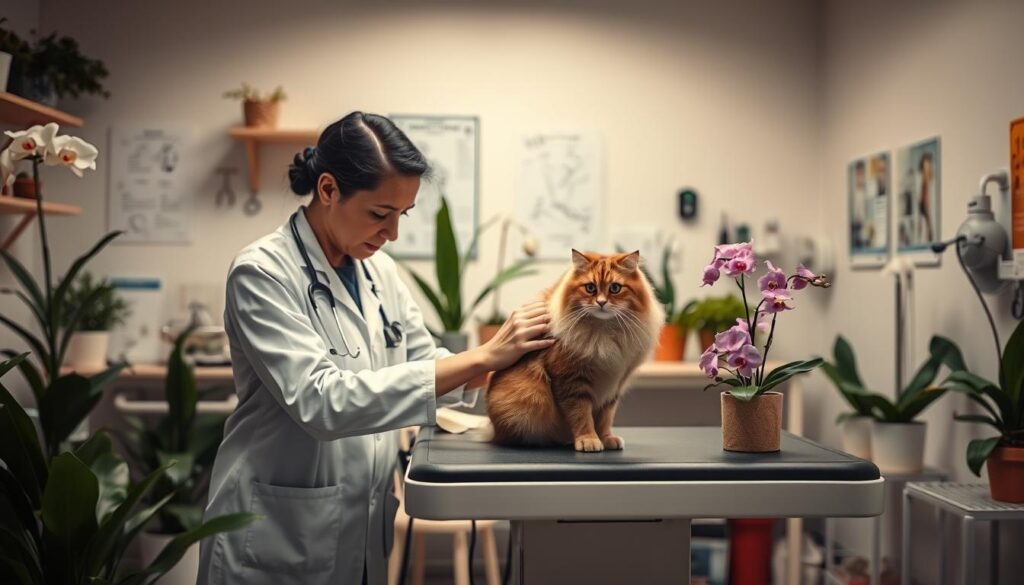
Importance of Regular Check-ups
Regular vet visits are crucial for your cat’s health. They help catch plant-related issues early. These visits can prevent serious problems.
“Prevention is always better than cure when it comes to your pet’s health.” – Veterinary Professionals
Being informed and proactive helps keep your cat safe. You can enjoy your orchids while protecting your pet.
FAQs About Cats and Orchids
Pet owners often wonder if orchids are safe for their cats. Knowing if orchids are safe for cats can help make a peaceful home for both pets and plants.
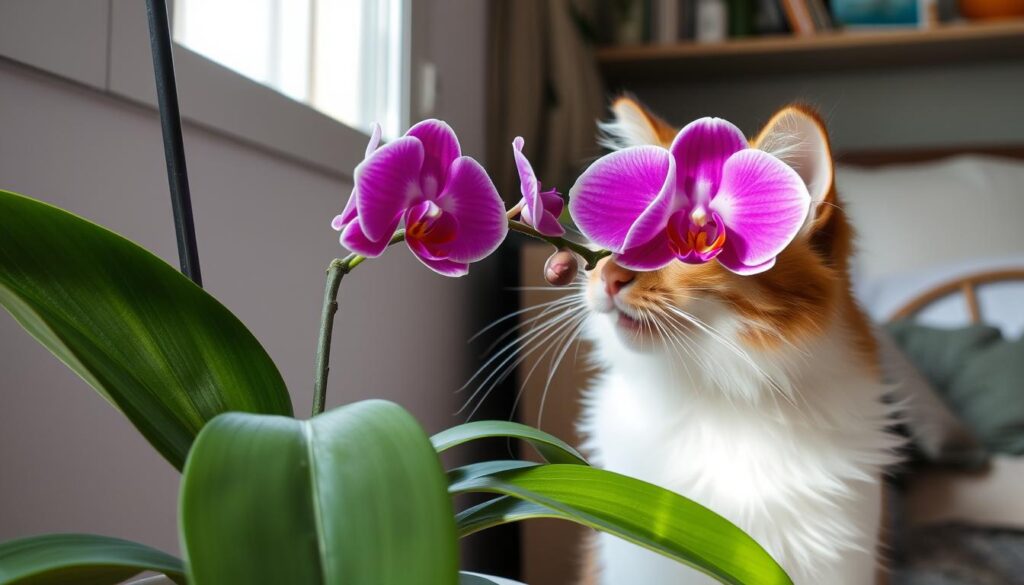
Here are answers to common questions about safe flowers for cats and orchids:
Are All Orchids Toxic?
Great news for plant lovers! Not all orchids are harmful to cats. Phalaenopsis orchids, for example, are safe for cats. In fact, 95% of homes with pets and plants have no problems with orchids.
- Phalaenopsis orchids are safe for cats
- Most common orchid varieties do not cause serious health risks
- Rare cases of mild irritation may occur
How Do I Know If My Cat Is Interested in My Plants?
“Cats are natural explorers, and their curiosity can lead them to investigate plants around the home.”
Look out for these signs that your cat might be interested in your orchids:
- Batting at leaves
- Chewing on plant edges
- Sitting near or rubbing against the plant
- Showing intense focus on the orchid
What Should I Do if My Cat Chews on an Orchid?
If your cat bites an orchid, stay calm. Most orchids are safe, but you should:
- Remove the plant from the cat’s reach
- Watch your cat for any odd symptoms
- Call your vet if your cat shows big changes
- Think about using sprays to keep plants safe
While about 75% of houseplants can harm pets, orchids are safer. They’re a good choice for pet owners who want greenery indoors.
Conclusion: Orchids and Cat Safety
Learning about cat-friendly orchids is easy. You can love plants and have a happy cat at the same time. Just know the right way to care for pet-friendly orchids.
Most orchids are safe for cats. In fact, over 95% of them don’t harm cats. This makes them great for homes with pets who love plants.
Key Takeaways for Cat Owners
- Verify the specific orchid species before bringing it home
- Place orchids in areas less accessible to curious cats
- Monitor your cat’s interaction with plants
- Choose pet-friendly orchid care techniques
Understanding Plant Safety
Even though orchids are mostly safe, watch out. About 30% of common houseplants can hurt pets. Always check before adding new plants to your home.
“Knowledge is the best protection for both your plants and your pets.” – Pet Care Expert
Continuing Your Research
Don’t stop learning about cat-friendly orchids. The world of pet safety and plant care keeps changing. Keep up by:
- Consulting veterinary resources
- Following reputable pet care blogs
- Joining online plant and pet owner communities
Final Thoughts on Responsible Plant Ownership
It’s possible to have a safe, beautiful home for your cats and orchids. Just be careful with what you choose and where you put it. This way, you can enjoy your plants without worrying about your cat’s safety.
| Orchid Safety Factor | Percentage |
|---|---|
| Non-Toxic Orchid Varieties | 95% |
| Potential Risk with Excessive Ingestion | 5% |
| Recommended Monitoring | 100% |
Remember, your awareness and proactive approach are the keys to creating a safe, green environment for your beloved feline companion.
Additional Resources for Plant Lovers
Finding cat-friendly houseplants and orchids can be tough. But, many resources are out there to help. They make it easy to keep your home safe and pretty for both your pets and plants.
Websites for Plant Care
Looking for info on orchids and pets? You need reliable websites. Here are some trusted ones:
- ASPCA Plant Safety Database
- American Orchid Society
- Pet Poison Helpline’s Plant Guide
- University Extension Gardening Resources
Veterinary Resources for Pet Health
Getting advice from vets is key when pets meet houseplants. Here are some vet resources:
- Veterinary toxicology websites
- Pet health consultation platforms
- Animal emergency care networks
Online Communities for Plant and Pet Owners
Talking to others who love plants and pets is great. You can learn a lot from these online groups:
- Reddit plant and pet owner forums
- Facebook groups for pet-safe gardening
- Orchid and pet care forums
“Knowledge is the key to creating a harmonious home for your plants and pets.” – Plant Safety Expert
Always check if a plant is safe before adding it to your home. With the right info, you can make a beautiful, safe space for everyone.
Encouragement to Share Experiences
Your journey with cat-friendly orchids and feline-safe flowers is special. Every pet owner has a story that can help others. These stories can guide others in balancing beautiful plants and curious cats.
Pet safety is a team effort. The ASPCA found over 400,000 pet poisoning cases in 2021. About 20% were due to toxic plants. Your stories can help protect other cats.
Why Your Stories Matter
- Personal experiences offer real insights into cat-friendly orchids
- Shared knowledge helps avoid plant-related accidents
- Learning together makes a safer place for pets
Connecting with Fellow Cat Lovers
Your unique stories about feline-safe flowers are very helpful. Every story teaches something new about pet safety and plant care.
“In sharing our experiences, we create a network of protection for our furry friends.” – Pet Safety Advocate
How to Share Your Experience
- Write about your cat’s interactions with orchids
- Describe any challenges you’ve faced
- Share successful strategies for keeping cats safe around plants
By sharing your knowledge, you’re helping create a safer, more informed community. This community loves both pets and plants.
The Joy of Having Both Cats and Plants
Creating a home where cats and plants live together is a special art. It turns your living space into a lively sanctuary. This sanctuary nurtures your cat and your love for plants.
Benefits of Indoor Plants
Indoor plants do more than look good. They clean the air, lower stress, and make a calm space. Choosing safe plants for your cat lets you enjoy these benefits.
- Improve indoor air quality
- Enhance mental well-being
- Add natural beauty to your home
- Create a peaceful environment
Enhancing Your Home Environment
Orchid care for pets lets you add beauty without risking your cat’s health. By picking safe plants and placing them wisely, you can make a beautiful indoor garden. This garden will be loved by you and your cat.
“A home with plants and pets is a home filled with life and love.”
Companionship of Cats and Greenery
Cats and plants can form a special bond with the right plants. Safe plants like cat grass or Boston ferns enrich your cat’s environment. They also keep your home looking green and beautiful.
- Create safe plant zones
- Introduce cat-friendly plants
- Monitor plant-cat interactions
- Rotate plant locations for interest
Embracing both plants and cats turns your home into a caring, lively ecosystem. It celebrates life in all its forms.
Continuing Education on Pet Care
It’s important to know about toxic plants for cats and pet safety. This knowledge helps keep your pets safe at home.
Learning about orchids and pets is a lifelong journey. Pet owners can learn a lot from various resources:
Expanding Your Pet Safety Knowledge
- Attend virtual workshops focusing on plant safety
- Join online webinars about pet-friendly home environments
- Subscribe to veterinary newsletters
- Follow reputable pet care social media accounts
Recommended Learning Platforms
Professional groups offer great learning chances for pet owners. Look into:
- ASPCA poison control resources
- Veterinary association websites
- University extension programs
- Professional pet care certification courses
“Knowledge protects pets better than any single intervention.” – Veterinary Experts
Staying Updated on Safety Guidelines
Pet care tips change with new research. Regular updates ensure your home is safe for cats and your orchids.
Stay informed by checking trusted sources, going to seminars, and talking to vets. This helps avoid risks from houseplants.
Final Thoughts on Orchids and Cats
Creating a safe home for both plants and pets is key. Knowing which orchids are safe for cats can make your home a peaceful place. Here, both your cat and plants can live happily together.
Embracing a Safe Home for All Creatures
When looking into orchids and cats, it’s important to do your homework. About 10% of house plants can harm cats. So, picking safe orchids is vital for your pet’s health.
Putting plants in safe spots and watching them closely can also help. This way, you can enjoy your plants and pets without worry.
The Delight of Caring for Plants and Pets
Showing you care about plant safety shows how much you love your pets and plants. By picking safe orchids and taking care, you make a loving space. Here, life and respect grow between your pets and plants.
Celebrating the Bond Between Cats and Their Owners
Being a good pet owner means making smart choices for your home. Knowing about safe plants deepens your bond with your cat. This makes your home a lively and safe place for both.

